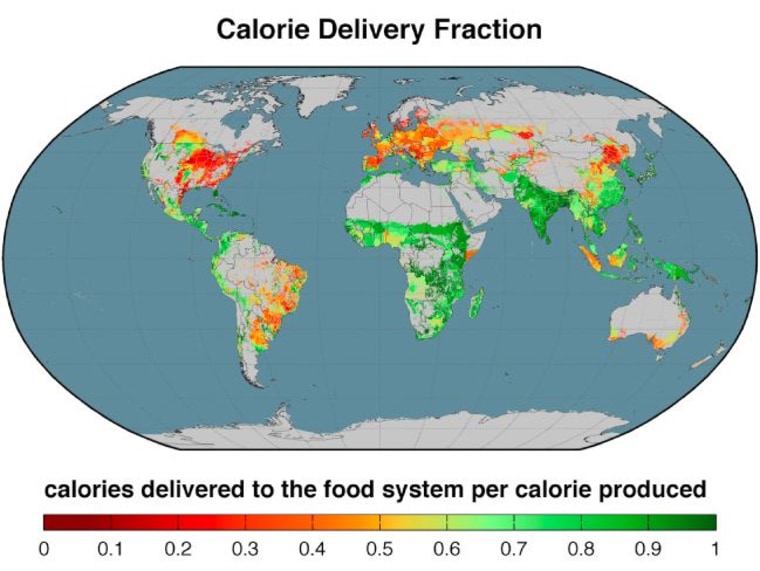The lab-grown burger taste-tested Monday in London is billed as one way to avert a looming food crisis by freeing up the agricultural resources used to feed billions of cattle each year. Another way to avert the crisis is to stop eating animal products altogether, according to a recent study.
In fact, "we find that doing a complete radical shift away from grain-fed animals, and stop producing biofuels, that you can increase calorie availability enough for 4 billion people," Emily Cassidy, a researcher at the Institute on the Environment at the University of Minnesota, told NBC News.
She and colleagues examined 41 major crops grown around the world, which account for more than 90 percent of global crop production, to find out how much food is being produced and how it is being used.
They found that 36 percent of the calories produced are used for animal feed. Of those, 12 percent wend their way to the human diet as meat and animal products. Another 4 percent of human-edible calories are used to produce biofuels.
Growing all those crops for direct human consumption instead increases available food calories by up to 70 percent, Cassidy and colleagues report in the Aug. 1 issue of Environmental Research Letters.
When those additional calories are translated to the number of people who can be fed a 2,700-calorie-a-day diet, the team's math shows an additional 4 billion people can be fed with food grown on existing farmland.
That's more than the 2 billion to 3 billion people scientists expect the planet to add by 2050, Cassidy noted, but at the same time "it is pretty unrealistic to just expect everyone to drastically reduce their animal product consumption and to stop producing corn ethanol."
Between the status quo of today and a meat, milk, and egg-free diet is a middle ground that can feed hundreds of millions of additional people with existing cropland. All it takes is a shift away from beef towards chicken and pork, which convert grain to meat more efficiently than cattle, she said.
As for the lab-grown burger, Cassidy said "the research is really fascinating." In addition to freeing up agricultural lands for other crops, research shows eliminating cattle could slash emissions of methane, a potent greenhouse gas, she noted.
For now, though, the $330,000 hamburger tasted in London is "not the kind of thing that is yet to market and certainly not affordable to most people."
John Roach is a contributing writer for NBC News. To learn more about him, visit his website.
